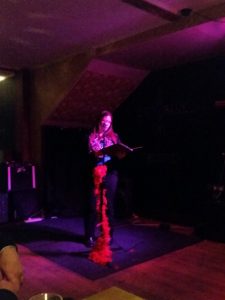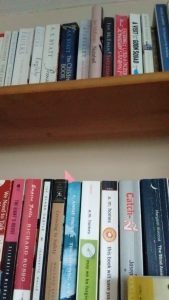This Week’s Bit of String: A thriving literature festival in a tiny Cotswolds town.
Hawkesbury Upton hosted its third annual literature festival last week, featuring among many other events a panel on ‘Writing About Difference.’ I went along to hear seven people who had written about firsthand experiences with disability or chronic illness. They were carers or had disabilities themselves, writing in fiction or nonfiction, poetry or prose, for children or adults.
The Inevitable Appropriation Question
Someone asked the panel how they feel about other writers with less personal experiences, writing about characters who have disabilities or illnesses. Concerns over appropriation and mainstream publishers’ sidelining of ‘Own Voices’ are prominent, particularly following Lionel Shriver’s controversial speech at Brisbane Writers Festival last year.
The panel generally responded that it’s necessary to have some knowledge. If you don’t have it, get it. If you’re not sure, ask someone to check. Moderator Dan Holloway emphasised the importance of sensitivity. ‘If you see no risk that you will offend, then you’re not the right person to write this.’

We need to be aware of our characters and the resonances they carry. We may think we’re being grand and inclusive, but assuming that we’re portraying something correctly could be arrogant. If we’re taking the time to fully consider what our characters have gone through, if we’re getting to know and love them as we should, we’ll be aware of the risks and take precautions to avoid them.
A couple panelists seemed dazed by the question, and it occurred to me that in a way, making this an issue is selfish of us. Some of the speakers care for children with disabilities and parents with dementia, and spouses with mental illness, all at once. They don’t have time to assuage our artsy worries. We must ensure we don’t see them as potential plot devices, existing only to provide feedback on what we write about their difficulties.
‘Help us…’
The Hawkesbury Upton session got awkward when a prim older woman in the front row posed directed a question Jo Allmond and her grown up daughter Jess Hiles. Jess writes children’s stories based on her experiences living with learning disabilities, and gives educational talks. Despite these achievements, Jo had just told us that sometimes when she accompanies Jess to appointments, the professional will take one look at Jess, assume she can’t communicate, and speak solely to her mother.
‘But why shouldn’t they assume she can’t communicate?’ the front row woman asked. ‘She looks different, you’ve said as much yourself. If I were to approach any of you others on the panel,’ she addressed Dan and Thomas Shepherd, who’s written a novel called Mr. Tumnall and also happens to have Aspergers, ‘and speak to you as if you were normal, you’d take offence, even though you look normal. It seems to me that people in your situations almost want to be offended. Obviously we can’t expect you to wear a label informing us of your capacities, but how can you expect us to know them? Help us, we need you to help us.’
Rustlings from the audience, fixed smiles from the panel. I immediately detected the acute, uniquely English fear behind the woman’s question: For the love of God, don’t let me embarrass myself by offending somebody. I felt for her a little bit. I know people enslaved to that fear.
However, she neglected to think, even in the presence of these exceptional people facing terrible struggles, that worse fates can befall someone than embarrassment. In obsessing over her desire not to be perceived as offensive, she was genuinely offensive.

While the speakers reassured her that basic, respectful communication (Good morning, isn’t the sunshine lovely today?) probably won’t bother anyone, the woman decided her point hadn’t been fully made. She wasn’t getting the help she wanted.
‘But you’re communicating for your daughter right now!’ she informed Jo. ‘She’s clearly not able to respond without you.’
Now, that’s crossing a line. I could see where the first question came from, misguided though it may have been. But how can someone insist that a person right in front of them is unresponsive, after being told that’s disrespectful and untrue? Jo and Jess had been answering in tandem, and let’s not forget that there are nonverbal means of communication.
‘Everyone’s Disabled’
So there was more backlash to that one. The panel kept impressively cool. Another lady in the audience, pink-cheeked and breathlessly earnest, stated, ‘I would like to suggest that we’re all disabled, we’re all restricted in some way.’
The audience liked this, and murmured assent. I wish I’d caught the panel’s faces at that moment, because the well-intentioned sentiment bothered me, and I imagined it might have bothered them.
Certainly, we all have problems. That’s why we need empathy! But a disability or chronic illness is a specific type of challenge. We wouldn’t say to a widow or widower, ‘Well, we’ve all lost somebody.’ We wouldn’t tell a refugee, ‘Well, we all have to relocate at some point.’ Okay, a few people might. But I don’t think that lovely woman would say those things.
So let’s not appropriate other people’s problems in perhaps an effort to diffuse our embarrassment or sense of survivor’s guilt.
How Can We Actually Help?
Buy and read books from all sorts of writers and listen to their Own Voices. Jo Allmond worked with another of the speakers, Joy Thomas, to publish Silent Voices, a wonderful volume of poetry from often overlooked people coping with disability. Thomas Shepherd’s book Mr. Tumnall sounds clever and intriguing. Check out Dan Jeffries’ memoir of coping with a rare medical condition, and don’t miss the children’s series Jess Hiles created, Jess the Goth Fairy. Follow Dan Holloway’s incredible Dandelion Project. Read Debbie Young‘s blog and books to see how a talented writer with first-hand experience depicts the journey of her family members with Type 1 Diabetes.

And as always, when we write let’s use well-rounded characters, and let them drive the story rather than be single-issue flagposts. LISTEN, observe, research. We should be doing that anyway, with any issue.
In my stories a few people happen to have mental illness or disability. Those are just parts of them; they have completely unrelated experiences that delight and move them. Because I’ve spent so much of my working life close to amazing people who cope with these challenges, it’s inevitable they’ll appear in my writing.
In The Wrong Ten Seconds, for example, the main character’s wife, Harriet, is paralysed and speechless after a stroke. He and his daughter struggle to care for Harriet’s physical needs while treating her mentally if nothing has changed. It’s a difficult balance, and one that writers about difference try to carry out. As the daughter says: ‘If we keep pretending Mum’s not in the state she’s in, don’t we risk minimising what she’s going through?’
Finally, let’s not seek a simple answer or a quick reassurance on this issue. Disabilities are tough–thankfully, the people who cope with them are often tougher. The balance between including diverse characters and appropriating those experiences from diverse writers never should get easy, so we need to maintain high sensitivity, and keep listening.




















